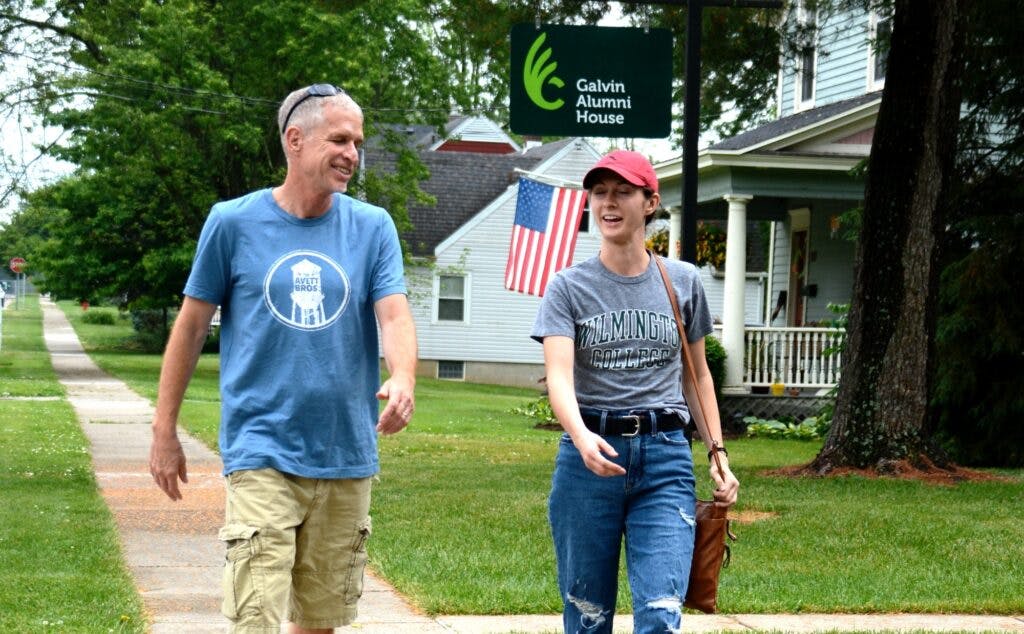Wilmington College Students Conduct Research in Support of Local Homelessness Study
Homelessness is a troubling issue — from the more than half million Americans identified as at least temporarily homeless and residing largely in major cities to those Wilmington residents living under a bridge just down the street.
PICTURED: Dr. Michael Snarr chats with Milena Wahl, one of the quartet of students who researched the local homelessness issue this spring.
Several Wilmington College students this spring conducted research as part of a solution-seeking initiative by the Clinton County Coalition on Homelessness.
Dr. Michael Snarr, professor of political science, is a member of the coalition's steering committee as a result of his role as a Wilmington City Council member and his work with Sugartree Ministries.
Tom Albanese, the consultant hired to provide insight into the local homelessness situation and how it can successfully be addressed, tapped into another of Snarr's affiliations in seeking his assistance. The WC faculty member directs the College's Honors Program, which is designed to enrich the academic experience of select students through a variety of opportunities that include voluntary service and civic engagement.
This past spring semester, several students, Milena Wahl, Riley Eberhart, Alyssa Harper and Taylor Powell-Abbinante, delved into a research project that included studying homeless shelters and related services, root causes of homelessness, the lack of affordable housing in the community, how to partner with law enforcement and the roles played by mental illness, domestic abuse, drugs and prostitution.
Also, some like Wahl had an opportunity to conduct in-person interviews with homeless persons.
"Through service work I do with Sugartree, I've built some relationships with homeless persons," Wahl said. "I found many are living with family members and friends — they're couch-surfing — or living in vehicles."
Albanese praised Snarr and his students for going "above and beyond" the norm to help interview people experiencing homelessness and housing. insecurity in order "to better understand" the conditions and struggles they face.
"These interviews help us put a face on homelessness in Clinton County," Albanese said, "and to see that all families and individuals deserve decent, safe, affordable housing, as well as support to overcome personal challenges and live a better life."
Wahl noted their research indicates the root cause of homelessness is insufficient affordable housing, housing assistance and services able to "meet people where they're at in life" and provide the right type, amount, duration and intensity of support to ensure basic needs are met. Also, untreated mental illness, cognitive disabilities and substance abuse can create conditions that cause persons to either lose or not access housing.
A point-in-time count in Clinton County from last September indicated 125 homeless as a result of input from the Clinton County Homeless Shelter, Sugartree Ministries, Hope House, Brightview, Talbert House and Community Action. More than three-quarters of those identified as homeless were not staying in shelters. Such estimates are often thought to be on the low side of the actual number experiencing homelessness at any given time.
Snarr said the community's lack of low-income housing is an especially complicating factor. He said most local homeless persons are unemployed and many don't have the funds to pay a damage deposit or first month's rent when trying to secure housing. Also, some have felony records, which present red flags to landlords considering their applications for rental properties.
"Most of them are long-term Wilmington folk — they just didn't show up here," Snarr added about the homeless in the city while lauding the entities trying to make a difference as part of the county's support structure.
"Tom is pulling together dozens of agencies, local government representatives and others interested in addressing homelessness," he said. "One thing that's going to come out of this is a better coordination of efforts in the community."
Wahl concurred by noting the most successful programs she researched feature strong partnerships involving entire communities that rallied around the common goal of wanting to help these fellow citizens. She noted how residents often tend to "dehumanize" the homeless and view homelessness only in terms of economic and crime issues, and as a public nuisance.
"I hope people can start recognizing the homeless population differently," she said. "These people are struggling and need help. They need everyone's help. These people matter — they're someone's child, brother mother and sister. I don't think the homeless situation is hopeless."
